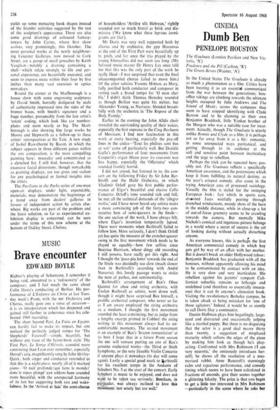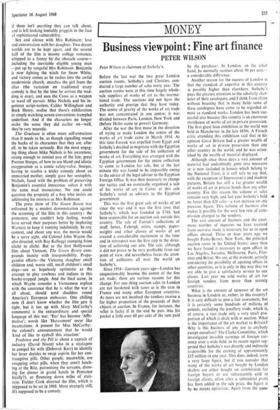CINEMA
Dumb Ben
PENELOPE HOUSTON
Prudence and the Pill (Carlton, 'X') The Green Berets (Warner, 'A') In the United States The Graduate is already as much a phenomenon as a film. Critics have been treating it as an essential communiqué from the war between the generations; box- office takings are climbing towards the ultimate heights occupied by Julie Andrews and The Sound of Music; across the campuses they seem to have stopped identifying with Clyde Barrow and to be claiming as their own Benjamin Braddock, little Yankee brother of the Morgan who was a suitable case for treat- ment. Actually, though The Graduate is utterly unlike Bonnie and Clyde as a film, it is perhaps not so far away from it as a hit : romantic, in some unexpected ways puritanical, and getting through to its audience at the soft and sensitive point between inarticulacy and the urge to rebellion.
Perhaps the trick can be repeated here; pos- sibly not. The Graduate reflects a specifically American awareness, and the pretensions which keep it from fulfilling its natural destiny, as the year's crispest comedy, also come in the trying American area of processed sociology. Visually the film is styled for the swinging European look : fast whirls in sports cars, drowned faces wistfully peering through drenched windscreens, moody shots of the hero in the middle distance, while in close-up a lot of out-of-focus greenery seems to be crawling towards the camera. But mentally Mike Nichols's comical and ingenious picture belongs in a world where a secret of success is the art of looking daring without actually disturbing anyone.
As everyone knows, this is perhaps the first American commercial comedy in which boy gets girl by way of an affair with her mother. But it doesn't break an older Hollywood taboo: Benjamin Braddock has graduated with all the honours, without apparently allowing his mind to be contaminated by contact with an idea. He is very slow and very inarticulate. His rebellion against his parents' rampant Cali- fornian suburbia remains so lethargic and undefined (and therefore so essentially innocu- ous) that it can fit anyone's alienation book. Visiting the revolutionary Berkeley campus, he is taken aback at being mistaken for 'one of those agitators.' Indeed, it would be as seemly to call Doris Day a communist.
Dustin Hoffman plays him beguilingly, large- eyed and distracted and occasionally yelping like a startled puppy. But there is no disguising that the actor is a good deal nearer thirty than twenty, a suggestion of misplaced maturity which softens the edges of the piece by making him look as though he's play- acting. Confronted with Mrs Robinson CI am very neurotic,' she ominously introduces her- self), he shows all the resolution of a mes- merised rabbit. Anne Bancroft's stunningly calm and rapacious performance, and comedy timing which seems to have been calculated in fractions of seconds, give their scenes together a glittering hilarity. The price is that you begin to get a little too interested in Mrs Robinson —particularly in the scene where he asks her
if there isn't anything they can talk about, and is left looking loutishly priggish in the face of sophisticated vulnerability.
Sex and silence with Mrs Robinson; love and conversation with her daughter. Two dream worlds are to be kept apart, and the second
half of the film is moony college romance, whipped to a frenzy by the obstacle course— including the inevitable eligible young man —put up by vengeful Mrs Robinson. Benjamin is now fighting the witch for Snow White; and victory comes as he rushes into the awful modernistic church, snatches the girl from the altar (the variation on traditional crazy comedy is that by the time he arrives the wed- ding i,s over), and uses the Cross as a weapon to ward off pursuit. Mike Nichols and his in- genious script-writers, Calder Willingham and Buck Henry, realise that there's exhilaration in simply watching screen conventions trampled underfoot. And if the characters no longer make the sense they did earlier on—well, they're very neurotic.
The Graduate is often more self-conscious than it needs to be, as though signalling round the backs of its characters that they are, after all, to be taken seriously. But the most engag- ing thing about Mike Nichols is his awareness, strong enough to remind you of the late, great Preston Sturges, of how to use bland and idiotic exaggeration as a comic safety-valve. Sturges, having to resolve a tricky comedy about an unmarried mother, simply gave her sextuplets. Nichols, faced with the problem of preserving Benjamin's essential innocence, solves it with the same mad insouciance. No one could question the propriety of a boy who insists on addressing his mistress as Mrs Robinson.
The press show of The Green Berets was enlivened by a modest demonstration against the screening of the film in this country: the protesters, one couldn't help feeling, would have served their purposes better by imploring Warners to keep it running indefinitely. In any context, and about any war, the movie would be a sorry sight, old Colonel John Wayne (he also directed, with Ray Kellogg) stumping from cliché to cliché. But as the first Hollywood film about Vietnam, The Green Berets com- pounds inanity with irresponsibility. Propa- gandist efforts—the Vietcong slaughter small children and, worse still, small children's small dogs—are as hopelessly optimistic as the attempt to play cowboys and indians in this booby-trapped jungle. And the final scene, in which Wayne consoles a Vietnamese orphan with the assurance that he is what the war is all about, should send shudders round America's European embassies. One chilling
note (I don't know whether the film gets it right, but it ties up with Mary McCarthy's comments) is the extraordinary and special language of this war. 'Yes' has become 'Affir- mative% words like 'Harassment' recur like incantations. A present for Miss McCarthy: the colonel's announcement that he would 'kind of like to eyeball this situation.'
Prudence and the Pill is about a captain of industry (David Niven) who in a stratagem to compel his wife (Deborah Kerr) to identify
her lover decides to swap aspirin for her con- traceptive pills. Other people, meanwhile, are
swapping other pills, when they aren't lunch- ing at the Ritz, patronising the servants, dress- ing for dinner in grand hotels in Penzance
(really?), or flouncing down miles of stair- case. Fielder Cook directed the film, which is supposed to be set in 1968. More strangely still, it's supposed to be a comedy.



































 Previous page
Previous page